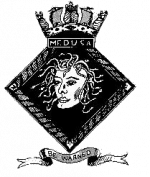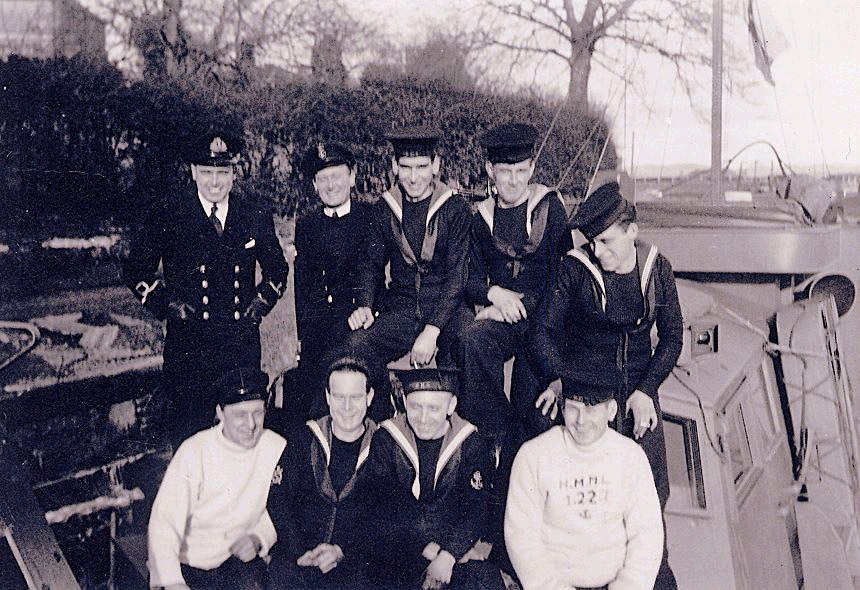HDML 1246
Robinson, Tewkesbury, Gloucestershire 14/4/43
London Gazette 5/9/44 – For Operation Brassard (Invasion of Elba)
- DSO TALtCdr Harry Donald Davis RNVR
Under heavy fire, found alternative landing place, provided smoke, reconnoitred inner beaches despite heavy fire. Displayed courage of highest order, efficiency, complete disregard for enemy
London Gazette 7/9/44 – For Operation Brassard (Invasion of Elba)
- DSM PO Samuel Lamont D/SSX27986
- DSM POEng Archibald Kiel Smith LT/KX114664
- MID Sea Owen Williams LT/JX203813
Known Crew
- TALtCdr Harry Donald Davis RNVR HDML 1246 For Operation Brassard (Invasion of Elba) DSO
- TLt E T J Shinn RNVR TSLt HMS Midge (Great Yarmouth) for minelayers 16/2/42 TLt 11/12/42 Commanding Officer HDML 1246 5/4/43
- TLt John Malcolm Hirst RNVR HMS Lauderdale TSLt 14/8/42 HMS St Christopher for MLs 16/11/42 ML 557 16/11/42,, TLt 1/8/44 Commanding Oficer HDML 1246 22/10/44 Commanding Officer ML 480 6/4/45 Minesweeping in the Adriatic from Porto Corsini to Trieste 3/45 DSC Commanding Officer ML 155 1945
- TLt Donald Mclean RNVR TSLt HMS Wildfire (Sheerness) for MLs 10/11/41 105th ML Flotilla Based at Sheerness HDML 1010 1/10/42 Commanding Officer HDML 1243 12/5/43 TLt 1/12/43 Commanding Officer HDML 1246 20/1/44 28th ML Flotilla Commanding Officer ML 307 12/10/44 Wind up of the war in Europe DSC
- TLt J L C Isotta RNVR TSLt 23/4/43 ML 567 7/5/43 Commanding Officer HDML 1246 2/4/45 TLt 23/4/45
- TLt W Roy Tyllesley RNVR Commanding Oficer HDML 1246 45 – 1/46
- TLt C H R Croot RNVR TASLt 19/2/43 TSLt 19/8/43 HDML 1243 24/5/43
- TLt 1/12/43 Commanding Officer HDML 1246 20/1/44 ML 283 9/10/44 Commanding Officer HDML 1308 31/5/45
- TSLt K F Metcalf RNVR TASLt 6/10/44 56th MGB/MTB Flotilla MGB 659 10/11/44 TSLt 6/4/45 HDML 1246 7/5/45
- TSLt J S Guiney RNZNVR TSLt 25/12/42 HDML 1246 5/4/43 HMNZS Cook
- TSLt A J H Durham RNVR HDML 1246 4/3/44 TSLt 8/4/44 ML 135 9/5/45
- PO Samuel Lamont D/SSX27986 HDML 1246 For Operation Brassard (Invasion of Elba) DSM
- POEng Archibald Kiel Smith LT/KX114664 HDML 1246 For Operation Brassard (Invasion of Elba) DSM
- LSea Norman Anderson LT/JX205273 HDML 1246. Died 16/08/1943, aged 23. Cause Unknown. Son of Arie and Jane Anderson; husband of Joan Anderson, of Penzance, Cornwall. Buried in Syracuse War Cemetery, Sicily
- Sea Owen Williams LT/JX203813 HDML 1246 For Operation Brassard (Invasion of Elba) MID
Wartime Activities
- Mediterranean
- 9/9/43 Operation Avalanche – Salerno Landings
- 17/6/44 Operation Brassard – Invasion of Elba
- Adriatic (Winter 1944 – 45)
Post War History
- 12/12/45 Arrived in Alexandria for repairs to Alexandria for Port Said
- 20/12/45 Trials for Palestine Police
- 21/12/45 Slipped for inspection
- 5/1/46 Palestine Police
From a Daily Telegraph obituary published 19/01/98:
John Malcolm ‘Jim’ Hirst was born 20/04/21 and was educated at Solihull Grammar School. At the outbreak of war, he joined HMS Glendower (Butlins at Pwilheli) and served in HMS Lauderdale as an ordinary seaman on Atlantic convoys before being commissioned. He served in ML 557 during Operation Brassard. He then commanded HDML 1246 in the Adriatic during the winter of 1944 – 45 before commanding ML 480 clearing mines in the approaches to Trieste where he won a DSC. His final command was ML 155 based at Flekkeford, Norway supervising German minesweepers clearing mines in the Skaggerrak.
Post war he studied Agricultural Botany at Reading University. He joined Rothamstead Research Station, Harpenden, Hertfordshire in 1950 and was appointed Head of Plant Pathology in 1967. He was awarded the Research Medal of theRoyal Agricultural Society of England and, in 1959, the International Botanical Congress’s Jakob Eriksson Gold Medal.
He was an international authority on plant biology and pathology and invented the Hirst Trap which revolutionised monitoring of airborne particles which cause diseases.
In 1970 he was elected a Fellow of the Royal Society.
Between 1975 and 1984 he was director of Long Ashton Research Station near Bristol and professor of Agricultural and Horticultural Sciences at Bristol University. He carried out work for the Overseas Development Corporation, Forestry Commission, Potato Marketing Board, Commonwealth Agricultural Bureau and the World Bank. He was also specialist adviser to the Overseas Development Sub Committee of the Foreign Affairs Committee of the House of Commons.
He was a member of the CFVA and hung the bell of ML 155 in his hall where his wife used it to summon him from the garden. He died in January 1998.
Reminiscence by Jim Hirst on the BBC People at War Website:
Soon after the South of France landings I had to leave the 31st. ML Flotilla to take command of HDML 1246 in the Adriatic. In an attempt to bring some order to the various warring factions in the islands and coastal regions of Yugoslavia the Royal Navy had placed a cruiser in each of the ports of Dubrovnik, Split and Zara (Rechristened Zardar by Tito). We were assigned to Zardar (in Croatia) to accompany and protect HMS Colombo from limpeteers, human torpedoes, etc. The normal duties of these small (72 ft.) boats was harbour defence but their size, quietness and extreme manoeuvrability made them capable of much more active but cryptic roles `among the islands’. These varied from placing or retrieving agents or air-crews to tying to coastal rocks under camouflage nets to detect and report enemy movement. (When I took over I understood that HDML 1246 was one of these `Special Service HDs’. I later learnt that several hours before the landing on Elba, she had a difficult time landing commandos to capture two `Flak-ships’ (F lighters) and to establish the `Beach Captain’ in readiness for the arrival of the main assault.) We had an extremely rough crossing from Ancona to Zara and stove in the forrard messdeck hatch cover but fortunately the deck level hatch survived. In Zara we berthed on top of a capsized German F Lighter for several weeks before someone thought of looking to see what it had been carrying. They found 70 (moored magnetic) mines each with c. 700lb HE. They were of course not armed but we felt relieved that by the winter of 1944-1945 raids by air or sea were almost over. We had a relatively gentle time but “Jugland” displayed chaotic confusion with six different land or naval forces of whom one did not know from day to day who was really friend or who foe. We found it strange to witness daily `tribal’ type dance performances by grenade-festooned partisans on the jetty alongside us. Fifty years later the troubles of Bosnia have sadly brought much more general realization of the local racial and religious hatreds. They seem no nearer to solution now than they were then. I enjoyed my brief spell in “1246”. It was a reliable, diesel-powered, strongly built boat that was extremely manoeuvrable, and had a tough largely Glaswegian crew. It offered a good start `in command’ but lasted only a few winter months.

